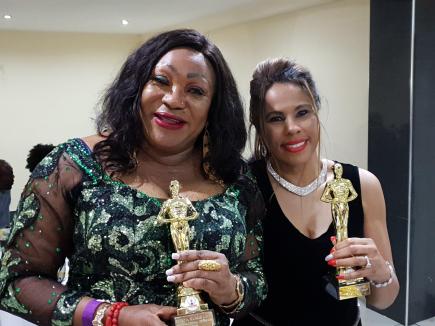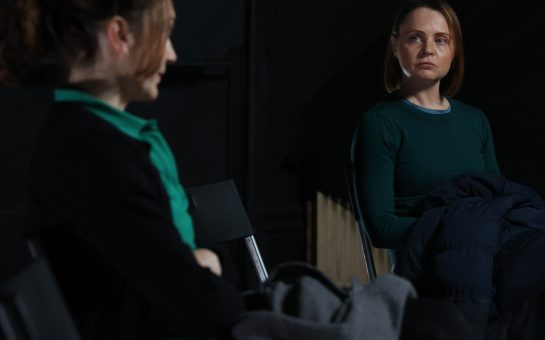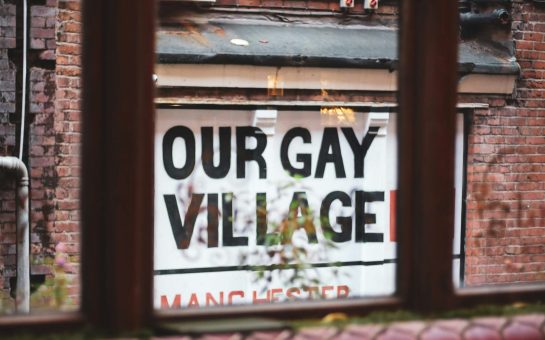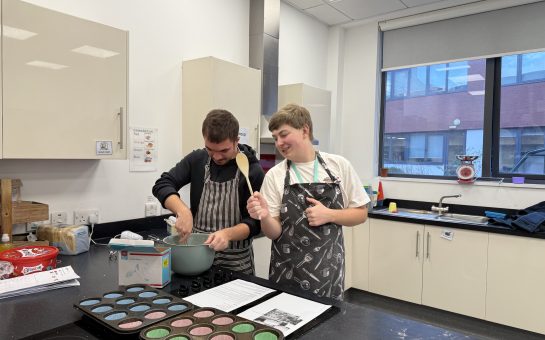When Patricia Ajayi was seven years old and living in Nigeria, she and her sister were taken away on ‘holiday’ with her grandmother and ‘cut’, without the knowledge of their parents.
“On the day I noticed women coming from the marketplace and arriving in our compound. There was water boiling and I thought the water was made for just killing the goat, I did not know that the water was meant as part of the FGM (female genital mutilation).
“Initially it was my sister that had FGM done and I was taken away to the front of the house so that I would not see my sister. There was a goat in the compound that they were going to use for the afterparty.
“The nurse arrived and cut my sister and I just heard this scream. I did not know what it was and after that my name was called and as soon as I got to the compound I knew something bad had happened to my sister because of what I saw – there was blood on the floor and equipment that was possibly unsanitized.”
Patricia began to cry, but was reassured that this was something her mother should have done but had forgotten, that they were going to become women and it was ‘part of the love’ her grandmother had for them.
“About two or three people held my legs apart and I can still remember vividly, as it was such a traumatising experience, and this was how I was ‘cut’. They immediately disposed of the flesh that was cut off me and my grandmother said that it was part of becoming women and if they did not cut us we would become promiscuous. I do not know what promiscuity has to do with the cutting of the clitoris?”
Female genital mutilation involves partial or total removal of the external genitalia of girls and young women for non-medical reasons. The procedure is often carried out without anaesthetic, usually by a woman with no formal medical training using a knife or razor.
It has no health benefits, causes physical and emotional trauma, and commonly leads to infection, infertility and even death.
Here’s what you need to know about the global fight to end female genital mutilation https://t.co/45gDIPF4fm pic.twitter.com/wiRgvSVErr
— BuzzFeed News (@BuzzFeedNews) April 10, 2017
It is common in many cultures, practised largely among African, Middle Eastern and some Asian communities. It is believed to be necessary for acceptance into the community and to facilitate a marriage match – as girls who do not undergo the procedure might be perceived as promiscuous. The belief that FGM equates to purity, cleanliness and strong morals are reasons why the practice continues.
‘I STILL HAD FLASHBACKS OF WHAT SHE DID TO ME’
Patricia moved to the UK in the early ‘90s and has worked as a nurse for over a decade. However, she still lives with the physical, psychological and emotional scars of FGM.
“Even talking about it is traumatising because of the flashbacks. When someone that cares about you, that loves you, someone that you respect in the family, could hold you down and ‘cut’ you and cause pain – you can imagine how you would feel later on in life.”
FGM survivors often suffer from mental health problems such as depression, post-traumatic stress disorder and anxiety.
“I would not want to be left alone with my grandmother because I still had flashbacks of what she did to me. But God bless her soul she thought she was doing the right thing, but she was not at the end of the day.”
The procedure can also have catastrophic social effects, impacting familial and sexual relationships, and a revolving cycle of illness-related work absences can cause financial losses.
Patricia is not alone: she is one of 200 million girls and women affected worldwide according to the World Health Organization.
FGM not only occurs abroad, it is commonplace here in the UK, and the largest nationality group of patients identified by the Manchester University NHS Foundation Trust since 2016 were from East Africa.
Whilst it is difficult to establish the prevalence of FGM, a recent Greater Manchester Combined Authority report estimated that within the region there are around 6,200 women aged 15 and over who have undergone FGM and a further 380 girls under the age of 15 who are at risk of the practice.
‘IT WAS NOT SPOKEN ABOUT AT ALL’
Patricia has been incredibly brave and shared her experience publicly, to raise awareness that FGM is ‘ferocious, barbaric and not something that should be practised anywhere in the world.’
Writing about her experience on Facebook was the only way Patricia could ventilate her thoughts, as ‘it was not spoken about at all’ previously, and she was experiencing post-traumatic stress and flashbacks.
However the response her social media post instigated, when she shared her story for the first time, highlights that speaking about FGM remains a major taboo.
“It was an emotional day for me. I was fearful, I was crying for almost 24 hours. I was alone in bed and I wrote about it. My sister read it and she quickly called me and said ‘you should not be talking about this, I do not want anybody to know that I have had it done.’”
‘A COMMUNITY SENSITIVE, HIDDEN CRIME’
FGM is against the law in the UK, as well as many other countries and it is an offence to take someone out of the country for the procedure.
This illegality drives it further underground. The first successful conviction for FGM last February sent a strong message that it will not be tolerated. However, the practice continues.
Angie Marriott, a nurse and leading FGM expert who has been promoting prevention and safeguarding since 1986, said: “Manchester has the fourth highest prevalence in the UK in terms of FGM. True numbers are very hard to pinpoint because it’s a community sensitive hidden crime.”
Just delivered a great training session to Manchester Airport Group with Leanne Brown and Jean Anderson OWAT to airport staff and security on Forced marriage and Female Genital Mutilation. Safeguarding, child protection best practice pic.twitter.com/tbJjnTJ8QN
— Angie Marriott (@MarriottAngie) January 28, 2020
“We have to remember the perpetrator is usually also a victim, a survivor of FGM pressured and coerced by the community to keep ‘cutting’ the girls,” she explained.
Angie frequently witnesses disbelief that FGM is happening in the UK from senior figures across the nation, even here in Manchester.
“They’re using the analogy that if all these cases of FGM were happening, then we’d see all these girls in A&E. My response to that is that 200 million women and girls around the world have undergone FGM, so we can’t use that complacency. It makes other professionals think FGM is not that serious an issue, and that concerns me greatly.”
Further preventing FGM from gaining the scrutiny it deserves is the government’s lack of commitment to tackle the issue. It remains hugely under-researched and funding for critical services such as corrective surgery and psychological support are in ‘tiny pockets and fragmented’.
“NHS England has talked probably for the last ten years about services and what should be out there, and that’s what a lot of professionals say to me it’s ‘When I’ve asked the question there’s nowhere for me to send them’, which is poor.”
‘WE NEED TO EMPOWER PROFESSIONALS’
However, FGM survivors are going undetected and are not getting the help they need as a large number of professionals are not asking women about FGM and reporting to the authorities.
Angie highlighted a safeguarding forum which conducted a dip sample on midwives asking mandatory questions and 55% of them had not asked their patients about FGM.
“So if professionals aren’t asking the question, we’re not getting the data and that’s another issue. We get that we’re not asking people have you broken your leg, we’re asking them have you had your genitals mutilated and we need to empower professionals to be able to deal with that.”
This was echoed by NHS doctor Lily Lloyd who believes that its crucial for FGM survivors to be identified by their GPs, before it reaches the stage where they need to go to hospital due to complications.
“We need to be asking questions because that would solidify that these women have not done anything wrong. Something awful has happened to them, they have had no part in what has happened and we need to get rid of this culture of shame around it.”
However, some doctors are ‘too scared to broach the subject’ as they ‘do not mean to offend’ their patients or are concerned they may even be labelled as racist.
“It is difficult because there are a lot of cultural barriers when they [BME women] go to their GP. It is not in their culture to have intimate examinations, especially by males, so it is really difficult for them.
“I do feel women who have undergone FGM are being let down. We are treating the medical issues as and when they present to us, which is normally in hospital. We are not treating the psychological or psychosexual aspects of it as well.”
‘FOR ME THE PREVENTION IS IN EDUCATION’
Even though Angie works with Greater Manchester Police, she sees herself foremost as an anti-FGM campaigner, is passionate about raising awareness of the practise and has trained well over a thousand professionals in the UK.
“It’s not about stigmatising and criminalising our communities, that is very important that we send that message.
“As a nurse if you start to tell men and women ‘if you cut your girls these are all the things they will suffer from’, that’s very impactful because with FGM the children are not coming from families where they are neglected or abused. These are warm loving families. It’s just that they’re entrenched in a cultural tradition that they feel they have to carry out. For me the prevention is in education.”
To better identify and support survivors, Dr Lloyd believes it is essential that healthcare professionals receive more exposure to patients during medical training, and emphasis needs to be placed on equipping them with the communication skills to broach the subject.
“The thing that I find quite difficult is that those patients [FGM survivors] are to be seen exclusively by a consultant. The more we know about it, the more that we can help, if that kind of topic is avoided for junior doctors throughout the whole of their training, I do not think that is particularly helpful.”
For all these women the eradication of FGM is the ultimate goal. No more so than for Patricia. Speaking out has always been of utmost significance to her, and she would like to see forums created so survivors can share their experiences and be signposted for the help so desperately needed.
“We have had the first conviction in Britain. This is to tell you that FGM should not be practised. FGM is very close to my heart – if the practise can be eradicated, it would be the best thing ever for women,” she concluded.

ULTIMATE GOAL: Patricia (left) and Angie (right) being awarded by the Wazobia and Ceebee Gold Foundation, Angie for outstanding achievement for her FGM work and Patricia for motivational speaker on FGM



